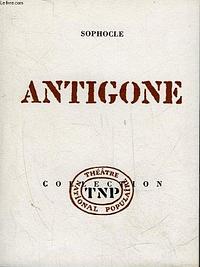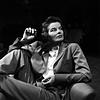You need to sign in or sign up before continuing.
Take a photo of a barcode or cover
Holy moly, that was so good, honestly one of my favourite plays and I would love to see this live.
The play was easy to follow and I loved the long monologues by chorus, Antigone and Creon, such powerful proclamations.
Highly recommended to everyone
The play was easy to follow and I loved the long monologues by chorus, Antigone and Creon, such powerful proclamations.
Highly recommended to everyone
"Vous me dégoûtez tous, avec votre bonheur! Avec votre vie qu'il faut aimer coûte que coûte. On dirait des chiens qui lèchent tout ce qu'ils trouvent. Et cette petite chance pour tous les jours, si on n'est pas trop exigeant. Moi, je veux tout, tout de suite, et que ce soit entier ou alors je refuse! Je ne veux pas être modeste, moi, et me contenter d'un petit morceau si j'ai été bien sage. Je veux être sûre de tout aujourd'hui et que cela soit aussi beau que quand j'étais petite ou mourir."
emotional
inspiring
sad
fast-paced
Plot or Character Driven:
Character
Strong character development:
No
Loveable characters:
Yes
Diverse cast of characters:
Yes
Flaws of characters a main focus:
N/A
dark
emotional
inspiring
reflective
sad
fast-paced
J'ai lu cette pièce il y a une douzaine d'année au collège ou au lycée. Je me souvenais vaguement de l'avoir appréciée mais il ne m'en restait pas grand chose de plus.
Je suis ravie d'avoir pris le temps de la relire car cette pièce est absolument magnifique et l'Antigone d'Anouilh est une héroïne fantastique, loin des clichés. Elle n'est pas forte, sa confiance en elle est parfois au plus bas, elle n'est pas parfaite mais tout au long de l'histoire elle poursuit son but sans flancher : elle refuse de faire des compromis avec ses principes par facilité.
Bref, j'ai adoré Antigone <3 Et je m'en vais de ce pas rendre le bouquin à la bibliothèque et me procurer mon propre exemplaire !
Je suis ravie d'avoir pris le temps de la relire car cette pièce est absolument magnifique et l'Antigone d'Anouilh est une héroïne fantastique, loin des clichés. Elle n'est pas forte, sa confiance en elle est parfois au plus bas, elle n'est pas parfaite mais tout au long de l'histoire elle poursuit son but sans flancher : elle refuse de faire des compromis avec ses principes par facilité.
Bref, j'ai adoré Antigone <3 Et je m'en vais de ce pas rendre le bouquin à la bibliothèque et me procurer mon propre exemplaire !
What I love most about this play is that there isn't a right side. Anouilh never give us a character, telling us "they're the one you're supposed to agree with".
None of the characters are lovable, nor despicable; they're human, flawed, proud and stubborn.
None of the characters are lovable, nor despicable; they're human, flawed, proud and stubborn.
Jean Anouilh’s Antigone is based upon Sophocles’ Antigone, the Greek tragedy centered around Oedipus’ daughter. If you have not read or heard of Oedipus Rex (or Oedipus the King), please read it or read about it, you won’t be disappointed. I’d say that Oedipus’ family is probably one of the most tragic and messed up families in literature.
After the tragedy of her father’s death, Antigone’s two brothers, Eteocles and Polynices, die while trying to fight each other to win the throne of Thebes. The new ruler of Thebes, Creon, Antigone’s uncle, decides that Eteocles deserves a proper burial, while Polynices is to be seen as a traitor and will be left without burial. The punishment for burying Polynices against Creon’s orders is death.
Antigone decides to disobey her uncle, and she secretly buries her brother knowing that she must face the consequences of her actions. The beginning of the play follows the aftermath of Antigone’s actions. Creon is placed into an impossible predicament. He does not want to put his niece to death, but he is obligated as the leader of Thebes to follow the laws he created.
Jean Anouilh’s play, Antigone, was first performed in Paris in 1944, during the Nazi occupation. Creon’s dilemma between his personal values and the law echoed the political situation of the day.
Upon reading the play in its entirety, I was able to grasp a deeper understanding of Antigone and Creon. Antigone is an ordinary girl and is often described as small and childlike. She is hardly the stereotypical hero. She goes through periods of self-doubt, and she truly does not want to die for her values. But there is an intrinsic quality about her that is unwavering. Creon is the antagonist of the play, but he is not a villain. He is someone who found himself unexpectedly as the leader of a city.
One thing I found extremely odd about Anouilh’s Antigone is his use of anachronisms. The play takes place in “Ancient Greece” except that there are cars, coffee, and cigarettes (amongst other things). This blend of old and new forces the reader to suspend disbelief. I sort of wished that Anouilh would’ve made his Antigone more modern. If the play were to be performed, I would suggest that the set should be as neutral as possible to embody both time periods to give the play an ageless quality instead of one grounded in a time period.
I would recommend Antigone to fans of theatre.
After the tragedy of her father’s death, Antigone’s two brothers, Eteocles and Polynices, die while trying to fight each other to win the throne of Thebes. The new ruler of Thebes, Creon, Antigone’s uncle, decides that Eteocles deserves a proper burial, while Polynices is to be seen as a traitor and will be left without burial. The punishment for burying Polynices against Creon’s orders is death.
Antigone decides to disobey her uncle, and she secretly buries her brother knowing that she must face the consequences of her actions. The beginning of the play follows the aftermath of Antigone’s actions. Creon is placed into an impossible predicament. He does not want to put his niece to death, but he is obligated as the leader of Thebes to follow the laws he created.
Jean Anouilh’s play, Antigone, was first performed in Paris in 1944, during the Nazi occupation. Creon’s dilemma between his personal values and the law echoed the political situation of the day.
Upon reading the play in its entirety, I was able to grasp a deeper understanding of Antigone and Creon. Antigone is an ordinary girl and is often described as small and childlike. She is hardly the stereotypical hero. She goes through periods of self-doubt, and she truly does not want to die for her values. But there is an intrinsic quality about her that is unwavering. Creon is the antagonist of the play, but he is not a villain. He is someone who found himself unexpectedly as the leader of a city.
One thing I found extremely odd about Anouilh’s Antigone is his use of anachronisms. The play takes place in “Ancient Greece” except that there are cars, coffee, and cigarettes (amongst other things). This blend of old and new forces the reader to suspend disbelief. I sort of wished that Anouilh would’ve made his Antigone more modern. If the play were to be performed, I would suggest that the set should be as neutral as possible to embody both time periods to give the play an ageless quality instead of one grounded in a time period.
I would recommend Antigone to fans of theatre.
challenging
emotional
reflective
tense
medium-paced
Strong character development:
Yes
Loveable characters:
Yes
Diverse cast of characters:
No
Flaws of characters a main focus:
Yes
My college is putting on a production of this (of course, in the spring, when I've already graduated, damn it) and I wanted to read it again. (I read it for the first time I think five years ago?) Tense, lyrical writing that flows so well and every character is developed fully. I adored this adaptation so much and I recommend it for anyone who likes Classical Greek structures. Ismene remains my favorite and I loved the relationship between Antigone and Ismene in this version!
Originally published on my blog here in January 2002.
Anouilh has taken over the plot of the play directly from [b:Sophocles|7728|Antigone|Sophocles|http://d.gr-assets.com/books/1165639463s/7728.jpg|1052210], while changing the characterisation of Antigone and her uncle Creon to make a point very clear (though presumably not to the German authorities) when originally produced in occupied Paris. His play is not about Antigone's choice but about the futility of resistance and the moral bankruptcy of both resistance and collaboration (the Germans being symbolised by Creon).
The story is basically that Creon has taken over as ruler of Thebes after the self-mutilation and exile of Oedipus; the former king's children grow up under his protection. The two sons, Polynices and Eteocles, eventually kill each other when the former leads a rebellious attack on the city. Creon therefore orders a hero's funeral for Eteocles, but Polynices is left in the open to rot, the death penalty being prescribed for anyone who tries to carry out the burial rites for him. Of his sisters, Ismene is unhappy but not willing to do anything, but Antigone is caught trying to bury the body. Creon tries to spare her, asking her to collaborate with him in covering up her crime, but she refuses and eventually her execution is ordered.
Where Anouilh principally differs from Sophocles is in the motivation of the characters. Antigone begins to defend her actions by claiming that piety is her motivation, but this is quickly demolished - she is known to find religious observance ridiculous, so how can her claim be anything but hypocrisy? Creon claims, in his turn, that he wants the best for Thebes, but he view the best as the preservation of the staus quo, especially when he can claim that he is driven by necessity to such acts as the desecration of Polynices' corpse.
There is an air of unreality about this play, partly because it has been modernised (so that Polynices was a wild young man who liked fast cars, for example), but mainly because Anouilh has changed the function of the chorus. In a Greek play, they tend to expand on the action, reacting in a way that helps explain what is going on or bring out the point the playwright wants to make. Here, Anouilh uses a single man, who is much more separated from the action, acting as a narrator, and constantly pointing out the artificial nature of the theatrical drama. The effect is alienating, and the intention is clearly to make the audience think about the message of the play rather than the events in the drama itself, to distance themselves from their immediate emotional reaction.
In many ways, the meaning of Antigone is bound up with the circumstances for which it was written, more so than is the case for most drama. (Indeed, this is so clearly the case that it must have been quite daring to put on, critical as it is of both occupiers and resistance.) It still has something to say, though, and that is basically that there is something banal about our motives even for important actions; not a cheerful message, but one to provoke some self-examination.
Anouilh has taken over the plot of the play directly from [b:Sophocles|7728|Antigone|Sophocles|http://d.gr-assets.com/books/1165639463s/7728.jpg|1052210], while changing the characterisation of Antigone and her uncle Creon to make a point very clear (though presumably not to the German authorities) when originally produced in occupied Paris. His play is not about Antigone's choice but about the futility of resistance and the moral bankruptcy of both resistance and collaboration (the Germans being symbolised by Creon).
The story is basically that Creon has taken over as ruler of Thebes after the self-mutilation and exile of Oedipus; the former king's children grow up under his protection. The two sons, Polynices and Eteocles, eventually kill each other when the former leads a rebellious attack on the city. Creon therefore orders a hero's funeral for Eteocles, but Polynices is left in the open to rot, the death penalty being prescribed for anyone who tries to carry out the burial rites for him. Of his sisters, Ismene is unhappy but not willing to do anything, but Antigone is caught trying to bury the body. Creon tries to spare her, asking her to collaborate with him in covering up her crime, but she refuses and eventually her execution is ordered.
Where Anouilh principally differs from Sophocles is in the motivation of the characters. Antigone begins to defend her actions by claiming that piety is her motivation, but this is quickly demolished - she is known to find religious observance ridiculous, so how can her claim be anything but hypocrisy? Creon claims, in his turn, that he wants the best for Thebes, but he view the best as the preservation of the staus quo, especially when he can claim that he is driven by necessity to such acts as the desecration of Polynices' corpse.
There is an air of unreality about this play, partly because it has been modernised (so that Polynices was a wild young man who liked fast cars, for example), but mainly because Anouilh has changed the function of the chorus. In a Greek play, they tend to expand on the action, reacting in a way that helps explain what is going on or bring out the point the playwright wants to make. Here, Anouilh uses a single man, who is much more separated from the action, acting as a narrator, and constantly pointing out the artificial nature of the theatrical drama. The effect is alienating, and the intention is clearly to make the audience think about the message of the play rather than the events in the drama itself, to distance themselves from their immediate emotional reaction.
In many ways, the meaning of Antigone is bound up with the circumstances for which it was written, more so than is the case for most drama. (Indeed, this is so clearly the case that it must have been quite daring to put on, critical as it is of both occupiers and resistance.) It still has something to say, though, and that is basically that there is something banal about our motives even for important actions; not a cheerful message, but one to provoke some self-examination.






